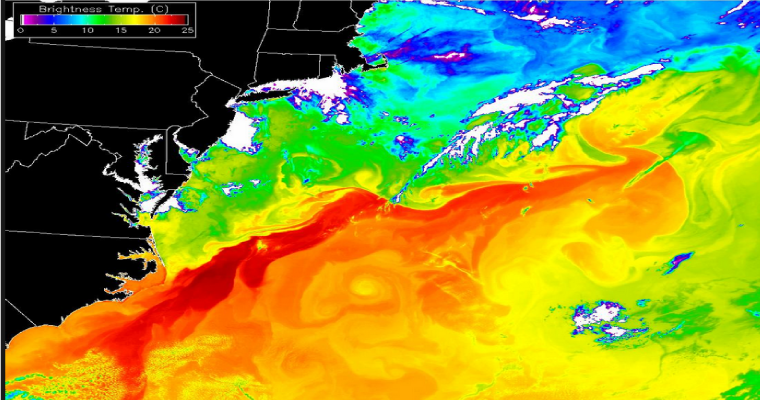
Last Monday we were treated to some science fiction from “Earthweek: a Diary of the Planet” as published in the Arizona Daily Star. The piece claimed the following:
Rapidly melting glaciers due to climate change are diluting the salinity of the North Atlantic to the point that the Gulf Stream has recently become the weakest it’s been in the last 1,000 years, researchers warn. The river of warm water that travels thousands of miles from the Gulf of Mexico to near Britain makes Northern Europe far milder during winter than it otherwise would be. The Gulf Stream is part of a major North Atlantic ocean circulation that pushes warm surface water northward and pulls deep cold water toward the south. But the major ocean ‘engine’ has now been found to be slowing down under the influence of rapid glacial melting in Greenland. ‘There is more than a 99 percent probability that this slowdown is unique over the period we looked at since 900 A.D.,’ Stefan Rahmstorf of the Potsdam Institute for Climate Impact Research.
Rahmstorf did not actually measure velocity of the Gulf Stream; instead he used a “multi-proxy temperature reconstruction” to postulate that cooling of the Atlantic meridional overturning circulation (AMOC), possibly from increased ice melt, may be slowing Gulf Stream velocity. Rahmstorf also called this an “unprecedented event.” Such characterization seems to be a favorite among climate alarmists. Rahmstorf ignored natural cycles in Gulf Stream velocity such as the Atlantic Multidecadal Oscillation. (Mathematician Steve McIntyre takes Rahmstorf’s reconstruction methods apart in two very technical posts here and here.)
There is also some disagreement about Rahmstorf’s velocity claim, mainly from researchers who actually measure Gulf Stream velocity:
Rossby et al., January, 2014, in Geophysical Research Letters:
In contrast to recent claims of a Gulf Stream slowdown, two decades of directly measured velocity across the current show no evidence of a decrease. There are variations of the current over time that are natural — and yes, we need to understand these better — but we find absolutely no evidence that suggests that the Gulf Stream is slowing down.”
New NASA measurements of the Atlantic Meridional Overturning Circulation, part of the global ocean conveyor belt that helps regulate climate around the North Atlantic, show no significant slowing over the past 15 years. The data suggest the circulation may have even sped up slightly in the recent past.
The findings are the result of a new monitoring technique, developed by oceanographer Josh Willis of NASA’s Jet Propulsion Laboratory in Pasadena, Calif., using measurements from ocean-observing satellites and profiling floats. The findings are reported in the March 25 issue of Geophysical Research Letters.
The Atlantic overturning circulation is a system of currents, including the Gulf Stream, that bring warm surface waters from the tropics northward into the North Atlantic. There, in the seas surrounding Greenland, the water cools, sinks to great depths and changes direction. What was once warm surface water heading north turns into cold deep water going south. This overturning is one part of the vast conveyor belt of ocean currents that move heat around the globe.
A few times a year the British media of all stripes goes into a tizzy of panic when one climate scientist or another states that there is a possibility that the North Atlantic ocean circulation, of which the Gulf Stream is a major part, will slow down in coming years or even stop. Whether the scientists statements are measured or inflammatory the media invariably warns that this will plunge Britain and Europe into a new ice age, pictures of the icy shores of Labrador are shown, created film of English Channel ferries making their way through sea ice are broadcast… And so the circus continues year after year. (Read more)
Dr. Judith Curry (Professor and former Chair of the School of Earth and Atmospheric Sciences at the Georgia Institute of Technology) on her blog Climate etc:
What we are seeing in the high latitudes of the North Atlantic is natural variability, predominantly associated with the Atlantic Multidecadal Oscillation. Based upon observational analyses, there is no sign of a slowdown in the Gulf Stream or the Atlantic Meridional Overturning Circulation.
About Greenland melting:
It’s not global warming, but rather, “The Greenland ice sheet is melting from below, caused by a high heat flow from the mantle into the lithosphere.” – See my ADI article: Greenland surprises.
See also articles from my Wryheat blog:
Greenland ice melt due to geothermal heat flux
Greenland “melting” and media hype
P.S. For more examples of science fiction from the Arizona Daily Star, see my post: Do newspapers have a responsibility to check wire-service stories?
